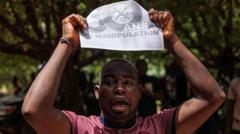Mali's military junta has officially dissolved all political parties, a move expected to heighten tensions with opposition groups demanding a return to democratic governance. The regime, led by Assimi Goïta, has faced criticism for its escalating suppression of political activities since coming to power.
Mali's Military Junta Bans Political Parties Amid Escalating Repression

Mali's Military Junta Bans Political Parties Amid Escalating Repression
The military leaders in Mali dissolve all political parties, intensifying the crackdown on dissent as the country remains under junta rule following recent coups.
Mali's military rulers have taken a drastic step by dissolving all political parties in the nation, as the military junta continues to tighten its grip on power after a series of coups in 2020 and 2021. A televised statement on Tuesday proclaimed that all meetings of political organizations have been banned across the country, a decision that has been confirmed by military leader Assimi Goïta, who is anticipated to maintain control for at least the next five years, despite previous commitments to restore democratic elections.
This latest decree is likely to provoke renewed opposition from political parties pushing for a resumption of democratic rule in Mali. The military authorities have ramped up their crackdown on dissenting voices over the past year. Just last week, two opposition leaders were reportedly abducted by armed individuals posing as police after a rare pro-democracy demonstration.
The junta's recent national conference, which was notably boycotted by major opposition groups, controversially recommended that Gen Goïta be named president through 2030, drawing severe backlash from human rights organizations and political figures alike. Originally, military leaders had pledged to hold elections in February 2022, but the climate of repression has since changed.
While the official statement on the dissolution of political parties did not specify penalties, it vehemently warned citizens not to defy the ban. It also emphasized that individuals involved in political or administrative roles could continue their work unattached to any political party. Notably, Nouhoum Togo, a member of the main opposition coalition and president of the Union for the Safeguarding of the Republic (USR), reacted to the dissolution, asserting that efforts to erase political identity do not dictate one's value.
In the wake of the national conference's recommendations, the suspension of all political activities has prompted significant public outrage. A coalition of approximately one hundred political groups had intended to protest against the transitional authorities last week, but opted to delay these plans in light of the new restrictions.
Under Gen Goïta's leadership, Mali has also fostered alliances with military regimes in neighboring Burkina Faso and Niger, shifting the region towards a closer relationship with Russia while distancing itself from France. Additionally, Gen Goïta has pulled Mali out of the West African regional bloc Ecowas due to its insistence on reinstating democratic governance—an action mirrored by both Burkina Faso and Niger.


















